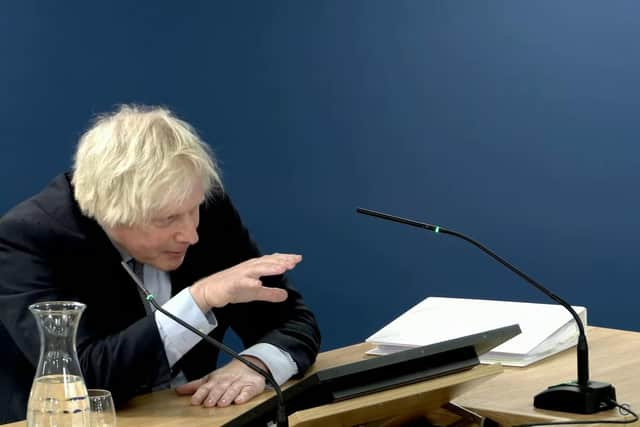Boris Johnson apologises to families of Covid victims and takes responsibility for pandemic mistakes
Speaking at the beginning of a two-day grilling at the official UK Covid-19 Inquiry, the former prime minister said that mistakes may have been made in the process of leading the response to the virus which claimed hundreds of thousands of lives.
He said that although hindsight made it easier to see how different decisions could have been made in order to save lives, he ultimately took responsibility for all the decisions that were made.
Advertisement
Hide AdAdvertisement
Hide AdFour people were removed from the hearing room after they held up signs reading: “The Dead can’t hear your apologies.”


Bereaved families protesting outside the inquiry’s west London venue said they did not accept Mr Johnson’s apology.
“Can I just say how glad I am to be at this inquiry and how sorry I am for the pain and the loss and the suffering of the Covid victims,” Mr Johnson said.
“Inevitably, in the course of trying to handle a very, very difficult pandemic in which we had to balance appalling harms on either side of the decision, we may have made mistakes.”
Advertisement
Hide AdAdvertisement
Hide AdMr Johnson, who stood down as an MP earlier this year, said that he took “personal responsibility for all the decisions that we made.”
This included the speed of the Government’s initial response, the timing of lockdowns, the effect on those in care homes and Eat Out to Help Out, he confirmed.
He said: “With hindsight, it may be easy to see things that we could have done differently or it may be possible to see things that we could have done differently.
“At the time, I felt and I know that everybody else felt that we were doing our best in very difficult circumstances to protect life and protect the NHS.”
Advertisement
Hide AdAdvertisement
Hide AdFacing a grilling from lawyers, Mr Johnson admitted that his government had “underestimated” the threat posed by coronavirus in the early days of the pandemic.
He said that in 2020 the virus "wasn’t really escalated to me as an issue of national concern” due to a lack of understanding of the data emerging from China.
However he rejected suggestions by former aides who have previously appeared before the inquiry that he had shown poor leadership, such as in changing his mind over whether to back tough restrictions on the population.
He added: “It matters to the livelihoods of people up and down the land. I had to go through the arguments and that is what I was doing.”
Advertisement
Hide AdAdvertisement
Hide Ad“Once the penny dropped” that scientists had been wrong about how rampant Covid already was in the UK, Mr Johnson said “it was pretty fast from flash to bang” in imposing lockdown.
When pressed on whether he questioned why lockdowns were “destroying everything for people who will die anyway soon”, but suggested the comment was not “designed to be publicly broadcast” and was “an indication of the cruelty of the choice that we faced and the appalling balancing act that I had to do throughout the pandemic”.
Covering how scientists, officials, ministers and he underestimated the “scale and pace” of the challenge to tackle Covid, Mr Johnson noted that the experience of previous diseases such as Sars, Mers and swine flu had clouded judgement as the a global coronavirus pandemic was “outside our living experience”.
During the full day of questioning Mr Johnson appeared on the verge of tears as he described 2020 a “tragic, tragic” year, becoming emotional when discussing his anxiety he felt at the time about imposing a lockdown too early without a vaccination programme.
Advertisement
Hide AdAdvertisement
Hide AdUnlike several previous witnesses, notably his chief advisor Dominic Cummings, Mr Johnson did not repeatedly blame others for the decisions taken in No 10, and defending Matt Hancock, the former health secretary, who though had “defects” was “doing his best in very difficult circumstances”.
He told the inquiry that he had personally rang the former official Helen MacNamara to apologise for not calling out expletive-laden remarks made by Mr Cummings which were aimed at her over WhatsApp.